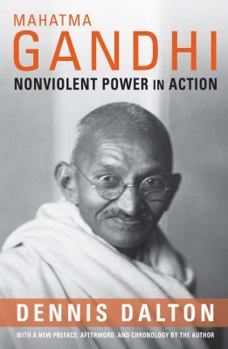Mahatma Gandhi: Nonviolent Power in Action
Select Format
Select Condition 
Book Overview
Featuring a new preface by the author, this book moves from the birth of Gandhi's method of nonviolent resistance in South Africa to an in-depth analysis of two of his signal triumphs: the civil disobedience movement of 1930 and his historic Calcutta fast of 1947. By focusing on these critical years, Dalton makes it clear that political leadership and a lifelong career in national politics gave Gandhi an opportunity to develop and refine his ideas and to test and perfect his ideals. The book concludes with a comparison of Gandhi to Martin Luther King, Jr. and Malcolm X, confirming Gandhi's relevance to the study of race and political leadership in America.
Format:Paperback
Language:English
ISBN:0231122373
ISBN13:9780231122375
Release Date:October 2000
Publisher:Columbia University Press
Length:304 Pages
Weight:1.05 lbs.
Dimensions:0.6" x 6.2" x 8.9"
Age Range:22 years and up
Grade Range:Postsecondary and higher
Customer Reviews
2 ratings
The POWER of the Truth Force
Published by Thriftbooks.com User , 26 years ago
I don't care to duplicate the academic praise seen in the above reviews. But I can tell you simply that Dennis Dalton was my professor in a class on Non-Violence at Columbia Univ. and it changed my life. At a period of time when I was an atheist, believing that all religion was just a set of rules to control people, D. Dalton demonstrated through the example of Ghandi that the Love and Truth force can be a powerful vehicle for change. This completely changed my view point from victim to activist. One could actually have spirituality from within, instead of imposed upon him or her from without. A tool, not a punishment. The 'truth' one has seems to be irrelevant; it is one's passion and belief and willingness to stand behind that Truth that triumphs. If it is True in the archetypal sense, others will join (not follow) you. And by direct action at the heart level, you can touch and change nations. This is not about passive resistance; this is about direct non-violent confrontation. It is about appealing to the best, the highest nature, of that which you confront. He showed me that one can change the world with one's heart; that truth can win. And now I just wait for Dennis to write the definative book on Emma Goldman... Truly a great teacher and initiator of the inner spark of one's own truth force. And with Ghandi as his guiding archetype, this book should be on the reading list of every activist.
Concise, thoughtful analysis of Gandhi's ideas.
Published by Thriftbooks.com User , 26 years ago
What a brilliant analysis of Gandhi's philosophy! This is an insightful collection of essays that illuminates the essential relationship between Gandhi's theory of non-violence and his practice of the same. Dennis Dalton uses two powerful examples: the Salt March of 1930 and the fast to end Partition-related violence in 1947. There is a fascinating conclusion between Gandhi's ideas and those of Martin Luther King and Malcolm X, illustrating the relevance of Gandhi's thought to present day issues.





